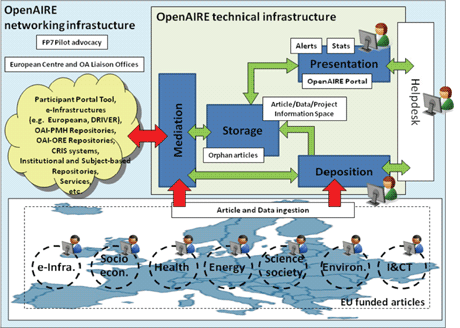OpenAIRE will deliver “an electronic infrastructure and supporting mechanisms for the identification, deposition, access, and monitoring of FP7 and ERC funded articles”, where the main supporting mechanism will be a European Helpdesk System. The infrastructure will be based on state-of-the-art software services of the D-Net Software Toolkit developed within the DRIVER and DRIVER-II projects and the Invenio digital repository software developed at CERN.
Although simple in conception, unrestricted availability of research publications (as well as scientific data) is still far from reality; the implementation of policies that promote Open Access to these important research products has proved to be challenging. For this reason, the recent European Commission Open Access Mandate pilot was followed by a Call soliciting pilot projects aimed at developing a software system addressing such issues in the context of published peer-reviewed articles reporting on outcomes of FP7 and European Research Council (ERC) projects in seven selected disciplines: energy, environment, health, cognitive systems/interaction/robotics, e-infrastructures, science in society, and socioeconomic sciences/humanities.
The OpenAIRE project was financed to meet the pilot requirements. Thematically, the project focuses on publications in the pilot seven disciplines and on research datasets in a subset of them: environment, health, cognitive systems/interaction/robotics, and socioeconomic sciences/humanities. Geographically, it has a definitive “European footprint” by covering the European Union in its entirety, engaging people and scientific repositories in almost all 27 member states and one associated state (Norway).
The project will deliver a technical infrastructure, through which Open Access publications and research data will be harvested, author-ingested, curated and fruitfully combined with EC project information, and a networking infrastructure, through which the EC Open Access mandate and OpenAIRE system will be disseminated across Europe and beyond.
OpenAIRE technical infrastructure
The technical infrastructure will be based on the D-Net software toolkit, developed within the DRIVER and DRIVER-II projects, and the Invenio digital repository software, developed at CERN. These already offer most of the desired functionality but will be enhanced and complemented with services developed within OpenAIRE to address critical requirements and issues that arise in the target environment and require further investigation.
The infrastructure will support the OpenAIRE Information Space, to be populated with bibliographic metadata records of Open Access publications funded in FP7/ERC projects. Such records will either be deposited directly by authors in the Invenio-powered repository (established to host so-called repository-orphan publications) or, after author or institution notification, harvested (and later curated) from the institutional and thematic repositories where they were originally ingested. Moreover, descriptive metadata about EC/ERC funded projects will be also ingested to be linked with the related articles and to enable further content analysis. In particular, monitoring tools and services will infer relevant information and statistics on FP7 and ERC funded research from articles, research data, project metadata and the relationships between them. Finally, OpenAIRE will develop a portal for easily searching, browsing and accessing its rich Information Space and statistic data.

Figure 1: OpenAIRE infrastructure.
OpenAIRE will work with several subject communities to explore the state of the art of research datasets management and their combination with research publications. Prototype services will be developed to demonstrate the feasibility of complex processes and structures and show the benefit for researchers in both depositing and re-using these combined information resource packages.
OpenAIRE networking infrastructure
The Open Access mandate of the European Commission has been an indispensable step towards free access to research results from Europe. Experiences with other Open Access mandates, however, show that acceptance and broad take-up by the scientific community critically depends on accompanying support mechanisms, as any activity beyond the actual research and publishing process is considered by researchers as administrative burden and essentially as a waste of time. Therefore, in addition to organizing advocacy, promotion, and training events, OpenAIRE will establish a networking infrastructure supporting structures and tools that enable article deposition to be carried out as easily and efficiently as possible, thereby ensuring that a critical mass of articles will be deposited. For this purpose, the project will deliver a European Helpdesk System, which will consist of a European Centre and national Open Access liaison offices in all but one EU member states and one associated state (Norway). The European Helpdesk System will be accessible online through the envisaged portal “OpenAIRE.eu”, which will also provide access to the FP7 and ERC research articles. From this portal, links will go out to national Open Access support pages, such as “open-access.net” (Germany), “rcaap.pt” (Portugal), “recolecta.net” (Spain), etc. The portal will also link to the European Commission “Participants Portal”, CORDIS, and other relevant trans-national Open Access initiatives and organisations, such as SPARC Europe and learned societies.
Conclusions
By facilitating access to scientific literature, OpenAIRE will allow European researchers to become more efficient in conducting their own investigations. Scientists and scholars from around the globe will be attracted to the OpenAIRE infrastructure and portal for their own work. A wealth of usage statistics and other impact metrics will become available to European policy makers and strategists, who will be able to use them to sharpen and refine policies on open access or other issues at the European level. Access to such statistics should also assist in identifying important scientific trends, key researchers in a particular domain, or other relevant variables, which may be helpful to better understand the European research landscape.
Links:
ftp://ftp.cordis.europa.eu/pub/fp7/docs/open-access-pilot_en.pdf
http://www.openaire.eu
http://www.driver-repository.eu/D-NET_release
http://cdsware.cern.ch/invenio/index.html
Please contact:
Donatella Castelli
ISTI-CNR, Italy
E-mail:
Paolo Manghi
ISTI-CNR, Italy
E-mail:










